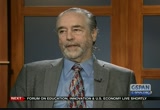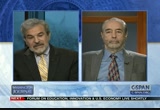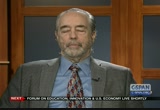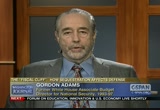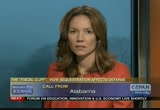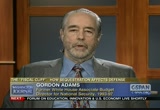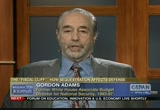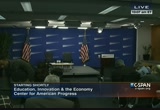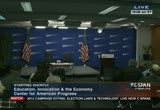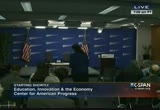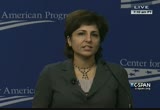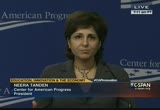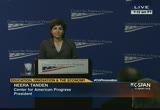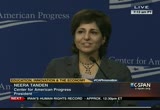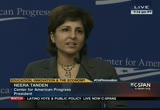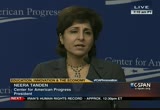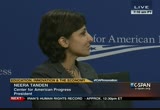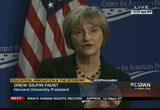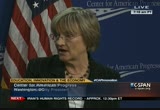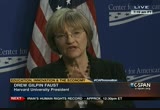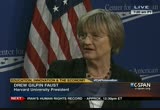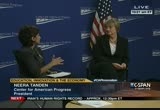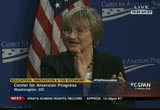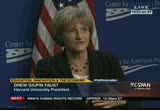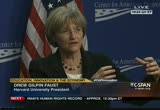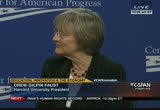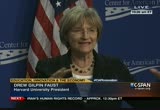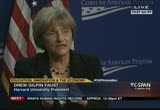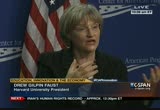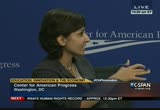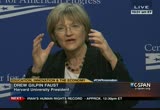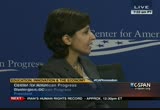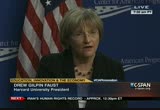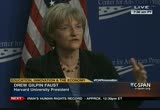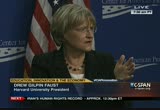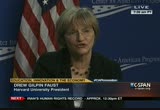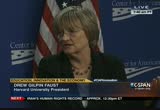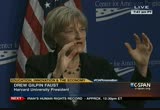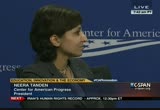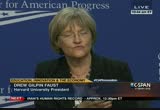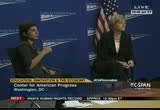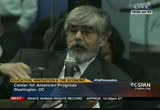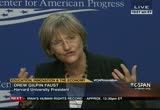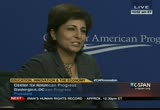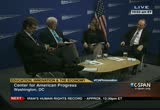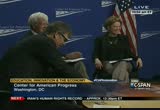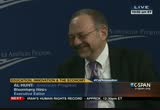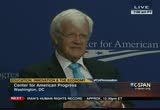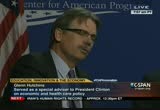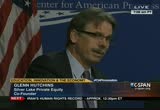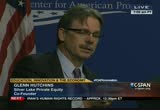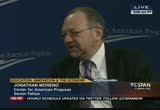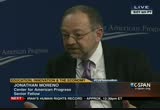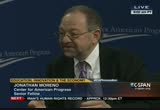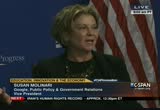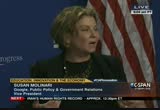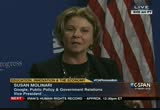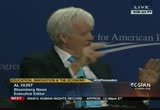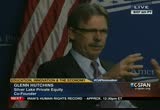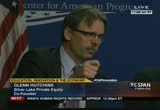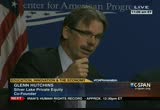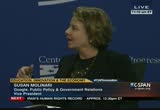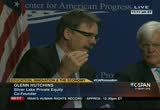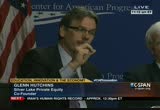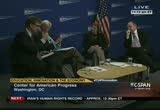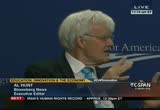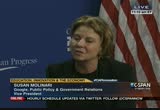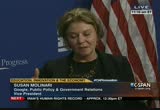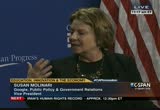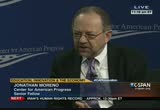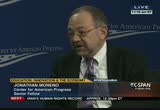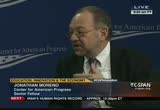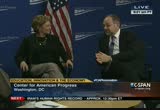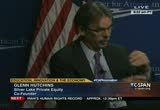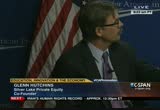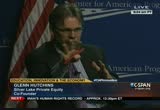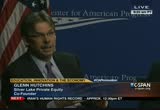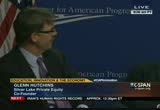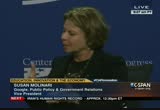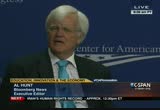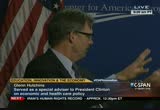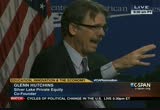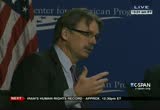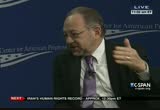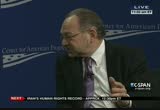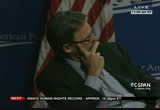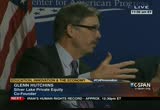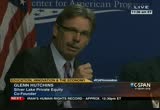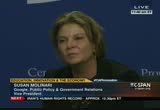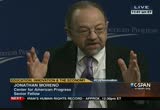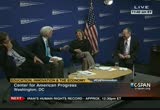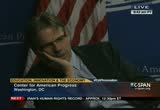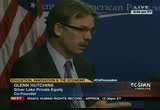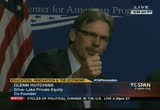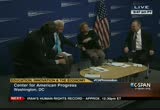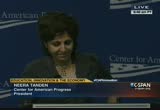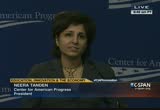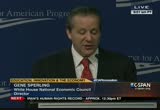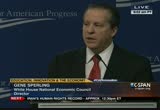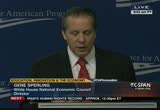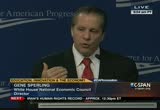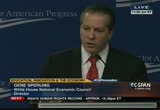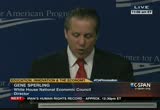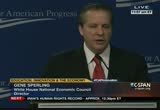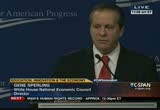tv Politics Public Policy Today CSPAN December 10, 2012 10:00am-12:00pm EST
10:00 am
of the gdp, altogether. -- proportion of the gdp, altogether. caller: on the military channel, last night there was a cia -- there is a documentary about two cia agents killed in washington by middle easterner. the wife said that is dirty money. the fine me raised it to $2 million. they found him and brought him back. he is executed in 2004. how about the united nations doing this? putting a bounty on people. >> there are legal issues.
10:01 am
we decided to treat this individual as a criminal. when you are overseas, that maybe what you have to do in order to get these people and bring to justice. i would never have that in u.s. hands -- i would rather have that in u.s. hands. >> i think george washington summed it up best. keep strong american borders and stay out of other countries squabbles. what ever happened to our christian ethics and foundation? >> the biggest change in
10:02 am
american foreign-policy since the republic was founded was the creation of nato in 1947. it was the point in time the united states said they would engage in other countries in our national interest. the previous 165 years of american history avoided those kinds of commitments. you can make your own decisions if it was smart. i think it was wise myself. it was a significant change in the orientation of american international engagements. that has been true since 1947. 65 years we have been engaged that involve the united states and the global leadership position. we want to leave or doing what to stay or do we want to alter?
10:03 am
those are the decisions of the obama administration would face. when you do not have the kind of resources that allow you to do everything you want to do in commit to every engagement, what are the priorities? what are the right choices? what would you allow others to do it? >> defense cuts cost jobs that the government cannot create jobs. >> i worked on a plane for four years. this is the biggest scam in the world. not the soldiers health care. host: why you say that?
10:04 am
caller: is a huge amount of money. i was spent millions fixing a plane every day. it is more money than you can imagine. guest: the government looks at every job and activity. it is really hard to make the case that they overcharge. it is much more expensive because the way the government does it. there is performance of based logistics. you can save billions. it is the way avis would do it for cars. even save huge amounts of money. that means getting the back office out of the way. it means fewer back office jobs. they do not want to give up the power. host: the contacting system is
10:05 am
really complicated. some of that is what the caller is saying. we have a lot of money through a system, a fair amount can disappear in ways we do not count. a history of 60 or 70 years of litigation against contractors to overcharge, contractors do overcharge. is not to say every contractor every time. we have a lot of money going through the system, some of that would stick to the wall it does not belong on. some of it will be over pricing. it is not a sole cause a problem. it is one of the problems. i am highly expectant. this has happened after every war. at some point there will be a serious investigation picking up on special inspector general activity in iraq and afghanistan.
10:06 am
somebody tried to rip off the system. there are a been 10 or 12 cases that have been prosecuted. host: we will live it there. thank you for an interesting and informative conversation. that does it for today's "washington journal." i want to take you to the center for american progress. higher education is the topic. they are talking about higher education and american competitiveness. [captioning performed by national captioning institute] [captions copyright national cable satellite corp. 2012] >> we are live at the center for
10:08 am
there are looking at out education and innovation can benefit the u.s. economy. this is getting started a little later appeared things in d.c. are little slower because of the fog. while we wait, some of the programming coming up are under way. we're airing to live discussions on voting in the 2012 election. panelists are looking at whether it will affect immigration policy. immigration works is hosting that discussion. it got under way at 9:00 eastern. another hour to go. a daylong conference on the
10:09 am
voter experience in 2012 with representatives from google, microsoft, and twitter. other topics include a voter i.d. laws and some of the long lines in georgia by voters. it will go on all day on c-span 3. the center for american progress is hosting this discussion on education, at innovation, and the economy. it should get started in just a moment.
10:10 am
10:11 am
event with harvard university and google. today's topic is innovation and education. we cannot get any better speakers for today's events. as washington is focused on the fiscal cliff and other issues are around the budget and long- term fiscal discipline, one may wonder why we're having an event on education. we are doing it because these issues are inextricably linked. insurers the united states is maintaining its edge in the global economy. america is role is central to that competitiveness. that has not just happened by happenstance.
10:12 am
it has been the work led by the private sector but decisions that have been critical to that success. we look at the questions around the united states fiscal discipline. we wanted to make sure that we have some discussion about the assessment we made in the role of issues that are not always at the forefront. the vital role america's universities have played. the fact that our institutions of higher learning are the best in the world and people from around the world want to come to the united states to be our next generation of on japan new hours because of our system of higher education. the staff that we have our
10:13 am
worldwide brands because of the innovations that they have made and that they continue to make. the role of investment and research. it plays a vital role to that. because of the innovation ecosystem. it is vital in the united states. it can be fragile if we make long-term decisions. we are having this discussion today. we are excited by this conversation. i will start the conversation with president drew faust of harvard. then we will have a panel, moderated by al hunt of bloomberg news. he has many years and many stories of washington appear that panel will be joined by susan molinari of google, glenn
10:14 am
hutchins was made very smart decisions in technology and understands the role of technology companies in the global economy. jonathan marino has written extensively about the united states investment in science and what it has meant for us on a whole host of issues. we will sort of a conversation with drew faust. \ let me spend a minute talking about that. drew, i am particularly enthusiastic to have him here. she is a woman leader. we have been focused on women's leadership.
10:15 am
she has been at harvard since 2007. before that she was at the university of pennsylvania for 25 years. her academic career has focused on the civil war and the american south. she has been a prominent historian. as the president of harvard, she is focused on ensuring that there is education opportunity for all, for insuring that harvard bring means adverse on every level and at harvard remains the place that is attracting the best in the united states regardless of background as well in the world. she has spoken eloquently about the role that harvard plays not only in insuring educational
10:16 am
leadership but our economic leadership as well. with that i like to invite drew up. [applause] >> thank you for being here. >> my pleasure. >> let's start on the topic of innovation and harvard role with in it. i think of harvard and other university is planning to roles -- two roles. you are teaching the next generation of entrepreneurs and your professors of making those discoveries. how do you see both of those layers? role ofou see harvard's
10:17 am
trading the next generation of leaders and discoverer's? you optimistic about harbor continuing that role? >> we have a lot of students who are making innovations. i think the two roles are blending. as they think about this moment, he talked about the moment where education is scrutinizing its investment in policy. to think about what higher education has been in need to be as we move through this decision making. we are the beneficiaries. this included the decision to invest scientific research with
10:18 am
universities. also the bill that says we are going to be a broadly educated population that values private education as a fundamental aspect. i think we have seen the results and what our country has become. also the kind of social mobility that these policies represent. as we think about these dimensions now, and there are two categories that you defined. how can we even expand on a country for individuals across the nation that had to make college affordable. had we make college imaginable? by that i mean students in secondary or primary schools that makes its a priority.
10:19 am
happily make sure they have the choices that we would like to strengthen the economic foundation and also enable them to be the kind of innovators that will build a dynamic economy. that is related to the research role on universities and how we are so dependent on support. at harvard we get a substantial support for scientific enterprise every year. we have about $700 million a year. out of that comes the discoveries that make the future possible. plastered harvard faculty apply for 197 patents. they founded 10 companies. just last year. it is not discovery that is important.
10:20 am
it can have an impact. citing patent in companies gives only a small picture of the importance of science and research universities. a lot of what they do is very basic discovery that one not generate a patent for a company. it will be the patent of discoveries 10 years from now. nixon's war on cancer yielded knowledge that a book us to combat it. -- that enabled us to combat it. if we said to not look beyond the blinkered about this we would greatly limit -- focus we would greatly limit the long term. this is something we need to
10:21 am
think about the longer-term future. we need to have a balance of educating the individuals who innovators and the ecosystem in which they can begin to discover even as they are freshmen in college. we get our students into the laboratories. the way to keep them in science this to happen the part of the research enterprise. there is a smooth transition for these kids we hope. >> i think that is a really important point. there's been so much discussion where we're feeling very constrained by choices at the
10:22 am
federal level. there are discussions making sure investments are targeted and things that will produce economic benefits. to some degree there is a concern that will leave of the honorable some of the investment in the most basic research. you cannot immediately see the impact of those kinds of investments. same time, it a benefit from the basic research because there's something that happens. do you hear a concern about basic research? why should every day americans be concerned with these reserve funds? there are questions about medicare or social security or public education. >> it is so important for the universities to keep on two t
10:23 am
racks. the one that is in the forefront. we have seen engineering at harvard grow dramatically. it is a field that is at the forefront and making those translations. we have had a doubling in undergraduates that are concentrating on engineering. it is zero efflorescence -- it is a real efflorescence of it. you can have the experience. dam it a company and they have achieving graduated yet and they go into -- and they make a company, they haven't even graduated yet, and they go on to better things. i do this once a month. i invite 15 faculty to come to
10:24 am
the building and sit around a table. most of them had not known each other before. the group happened by chance to include a nobel prize winner in medicine from our hospital. he was a member of our medical school. i see what is on your mind? they wanted to tell me how hard it was to get support for basic big question research. when grant applications were evaluated they were pressed to have a narrow a focus as possible to say exactly what the great was going to enable them to discover. they set off the we know before we even started. if you have a really big question, it is much harder to do that. i think that is very frightening.
10:25 am
i was at an event on friday. one of our extraordinary young investigators who was just on year was talking about how the general studies in human development and embryology have been the basis for so many ies in hisal discover field. he's trying to make the link between questions or one ke.never may b we make sure for our grandchildren we have established the foundation. other questions that research ies anden apply realit discoveries.
10:26 am
10:27 am
my tips can continue to do their work. the larger question asked about what we need to look at, we need to ask a lot of questions about our system and say that is the foundation for higher education for those who will be innovators in the future. the harvard business school last your did a competitiveness survey. they found higher education institutions or america's greatest asset. they found one of the highest concerns of the many leaders in business that they serve it was the state of k-12 education which was seen as a huge disadvantage in american competitiveness.
10:28 am
students who are coming to college, up 43% are not ready for college in one field or another. universities need to do considerable remedial work before they can even start the students on the treasury to what a college education should be. had we begin to address the challenges that this has had a number of exciting innovations. they are trying to in able research, uniting that with business school faculty that shows how you lead an organization like a school district or school.
10:29 am
and what they can add to train educational leaders who can transform systems. this has been a popular degree. it has wonderful candidates who go through its. this is just one contribution our school is making and others as well. we need across the country to have a unified approach to the policy that is embedded in our k-12 system. >> we did a report last year a few months ago buntline and india's investment. -- china and india's investment. the rep level in which they are investing. from pre-k through college.
10:30 am
there will have more in china and any of them the entire u.s. work force. we're focused on a global economy. those from harvard are competing globally with students from china, germany, brazil. tavis that transform the way we think about education? do you think your role as straining american leaders? are you looking at attracting global leaders? >> there are so many questions. let me address a few of them. there are numerous kind of statistics that we have a preeminence of college graduates in our populations and levels of participation. we are losing this.
10:31 am
we have once last three of the world's college graduates. that is an interesting illustration of a shift in the dynamism. i see this when i travel. a huge commitment to public resources. huge energy to enthusiasm of higher education. india wants 15 -- 1500 new universities by 2020. meeting about hong kong this week. i learned that hong kong university is expanding undergraduate education from three years to four years
10:32 am
because they think it is not giving students enough time. there are all these buildings going up. here we are being told in the united states that maybe we should reduce ourselves from four years to three years. another aspect. let me insert tear. so much of what our discussion is about. with travel to india and china ever was to hear about the liberal arts. they want to introduce a broader education into their countries. they think that the ability to imagine, it to be creative, and to envision a world differently relates to understanding other places and people. these are so much a part of the
10:33 am
humanities and social sciences. it is the whole panoply of the liberal arts. this is under tremendous pressure. there are recognizing this advantage. why do we want to spend our time on a broad education? we need to be very careful about this. it may have longer time to an educational system but have really important and fax in which we have not realized efficiently. >> 1 issue that has come up is the work you have done.
10:34 am
there has been a lot of excitement as a tool to really learning a larger group of people. and the opportunities that abound in that space. there are some concerns it will be distracting from education. why are you engaged in this work tha? are you engaged? >> we are really excited about this project. we have joined women to promote and advance. it opens a number of possibilities for us.
10:35 am
how can we use these digital technologies and learn from them to change education on our alone campus. what weighs will we see based on the experience of these mass courses. how can that transform in cambridge and boston. secondly, we see it as a way to get harvard ideas and harvard teaching out to a broader world and way to accumulate a lot of data that can be an extraordinary resource for anybody who like to use that material to ask questions about the nature of human learning and how it ought to be structured. on the point about spreading learning to the rest of the world, i have a very moving reaction to one bit of data.
10:36 am
one of the pilot courses. when i was in india, i met with people in india who were wanting to interact with harvard. there is a need for engagement with our schools public health. we have enormous challenges in that area. i was talking to these individuals about what kind of courses we might involve them in.
10:37 am
this online course that i described steele has overall more than 40,000 students and 9000 of them come from india. last january i was thinking how can i put people together and what programs mikonemight we run? this is dazzling. i would like to get a map of where they all are in india. i do know based on another conversation last week that 150 of these people in mumbai got together last week and said we do not want to be a virtual undertaking. we want to talk with each other. there is a flash mob of epidemiologists as they came
10:38 am
together. >> a different type of/mob. -- flash mob. there's so much talk about s.t.e.m. and the growing number of students. the market run normally are you optimistic that we'll get more and more students given harvard's experience? or is there something we should be doing more? >> of both things are true. we're seeing many more students interested in science. we're seeing the doubling of the engineer concentrators within the last three years. 29 sermon that entered the spa
10:39 am
for concentre -- 29% that enter this fall were concentrated on life sciences. we have been were he on how to teach science, getting kids involved in research early. that is one way to get them engaged. they are engaging in persisting in science. then there are questions about how do they understand there opportunities? going back to this area a basic research, as we look at funding.
10:40 am
how do they think about this life of going after in list uncertainty about whether the life of a researcher is possible. i worry about the choices they will make. we are doing a good job getting them up. are also questions about how they sort themselves out into careers and have a huge that region and how they use that knowledge. he asked every day and how they use that knowledge. -- about how they use that knowledge. you asked about k-12. if we do not have science teachers in k-12 some small
10:41 am
percent actually have training. a lot of our students are going in to teach for america. ask one moreto question and then turn it over to the audience. by last question will be on immigration. yet spoken on the need for the dream act. can you talk about that? >> what first drew my attention was my first year of president a group of students came to see me, about 12 of them. they were all undocumented. they said we want a to support the dream act. they describe to me their lives. i was just stunned by their stories of growing up usually in the southwest or the west in families where they had no idea they were undocumented.
10:42 am
then there came a moment with the needed documentation and they realize they were not citizens. suddenly they were thrust into this awareness of a whole nother world of not flying on planes to get back from vacation or not going home for vacation at all because they cannot travel are not being able to imagine medical school because they needed documentation to do that. i thought this is awful. if you come to this question as a human rights or as an economic development? both. here are these extraordinarily talented students who ought to take on the world and they worry that when a car comes near them that they are thought to be picked up and deported. i thought this is horrible. the world seems to be speaking out on the dream act now. i hope we will see real progress
10:43 am
in this area. students are worthy of this. it is a human right for them. it is so important to have a welcoming immigration policy. that is what built our strength. we see the contributions of immigrants make to the innovation in economy. something like 40% of the fortune 500 companies were children of immigrants. there are all these ways in which innovation and immigration have been tight. we need to support that. >> we did a report recently that demonstrated it to be $329.
10:44 am
a lot of that is because people would feel free to engage. with that we're going to turn over to questions. we have a few moments and then we will be ready for our next panel. if you could provide your name and try to make it a brief question that would be great. >> i am a sociologists. i've worked and higher education. i question has to do with finances. what are the challenges you face? in an economy with challenges, how can young people from non affluent families of four college? it would be good to hear some of your thoughts and how we can in able -- enable it appeared >> we look at what a variety of
10:45 am
different institutions can do. we have made significant progress on the price of undergraduate education with a financial a policy we have introduced over the last decade. 600 cover undergraduate are on financial aid of our undergraduates are on -- 60% of our undergraduates are on financial aid. society has to ask questions about what is the public nature of the educational enterprise. we have taken are strong universities and significantly
10:46 am
reduced in their support for public higher education. if we look at our public right comes from the 10% state. what are the implications of that for our society? i think this society ought to increase education as a public good. we have been backing off for that at a time when the competitive forces have only expanded. this greatly disadvantaged is the united states. that is part of this a question of what is the students -- what are the students needing to do.
10:47 am
>> the industry is well aware that this great resource at the university. universities have been clobbered it to an extent. there also dangers. i wonder how harvard policy toward these arrangements with industry have evolved. he mentioned the public. did they do not have the resources harvard has. what suggestions do you have for the nature and extent of cooperation? >> i see it as related to the reports. he urges that the industry must invest more in higher education. i had a conversation with him
10:48 am
saying we are free riding a bit. i think that is terrific. i welcome the attitude. you have pointed to something important. one set of this has been to encourage the transitional aspects, to set up a transfer office that is much more engaged into marketable products to connect our faculty with opportunities to commercialize this more directly. then there are institutional partnerships. we need to negotiate how we move into this territory. this is a new territory for many of us. we have principles of academic freedom that we wish to sustain.
10:49 am
industry has a need to process for its investment. we need to figure out what the overlapping is. is it buying complete control dot i think that would be a hard one for universities to swallow. one of the things we are wondering, nothe property we own over the river, one of the commitments we are making is to an enterprise zone where we hope to have some private endeavors side by side, maybe even sharing harvard scientists. that creates an ecosystem of sharing and translation.
10:50 am
if you are right. there are certain aspects of contrary missions we need to resolve. industry needs us. >> we have time for one more question. this will be the last one. >> we have been talking a lot about s.t.e.m. this morning. your background is in the humanities. if you look at funding from the 1970's compared to finding today, proportionally if neh were at the same level as it were in the '70s the budget would be over $1.2 billion. does the national disadvantagths
10:51 am
10:52 am
i embrace what you say. i worry about the decline in humanity concentrators even in institutions like ours. there are some places where the humanities are expendable when we have to constrained resources. i think we do ourselves a terrible disservice as a country. it does not focus on how to get where it needs to go but knows where it ought to be going. that is a fundamental obligation. >> a great ending to a great panel. thank you. [applause] i'm now going to invite al hunt to come up and introduces panel. in the last session i said gene sperling would be joining us
10:54 am
i am delighted to be here. let me tell you one quick story about our host. when i met neera when she was policy director for hillary clinton and barack obama, i did a column or i refer to her as the sugary ray robinson. he was a pound for pound the greatest boxers. she was the sugar ray robinson of policy record. everytime i see here i say "hi, sugar." when my younger reporters heard this and it to a colleague "it is just a different generation." i am sorry, sugar. what i'm glad you explained that.
10:55 am
>> it is terrific to be here. what a great panel. gleen hutins is the founder of -- glenn hutchins is the founder of silver lake. he is a tremendous asset at harvard as a great adviser. his real claim to fame is he is the part owner of the boston celtics. if we start to in any way need to but the more we will talk about that. jonathan teaches at the university ebbs pennsylvania. he has written 150 books. i say about pat moynihan that he had written more books than most
10:56 am
senators have read. i in dazzled by that. -- i am dazzled by that. he has also -- is also a senior adviser at the center for american progress. he's very interested in the subject. susan, we have to stop meeting like this. we have done more seminars. susan has been a rock star -- >> since you used to yell at me over the crossfire. >> the think it is and the only past seven years. she rose to leadership. mark.eft a real wa washingtonogle's
10:57 am
office. she's always been on the cutting edge of things that really matter. let me start off by saying i do not think there is an anti- innovation caucus. i do not think there is anybody who is opposed to innovation. it is a little bit like apple pie or rg3. let me ask you all to describe what we really mean by innovation. what are the two or three priorities we ought to really be talking about? glenn? >> at the u.s. start on that side. >> i go to my right first. -- i thought you'd start on t hat site. >> ago to my right first. >> there are three types of innovation. one is scientific innovation
10:58 am
that allows the second innovation which is the technology innovation, to take the underlying discovery and commercialize its, turning it into a product that can be used for consumer customers. what is equally important is how you can then take a discovery, it turned into a technology, and you can deliver it in a way that allows you to build a business that gets you a margin that can support the business. basic science innovation, technology innovations, and business model innovations are the ones we think of. google is a good example of all three. i was on the board of a company
10:59 am
[inaudible] they had about $13 billion in revenue. that revenue came from products that were 120 days below last told. they have to reinvent nearly $13 billion in revenue in 120 days. disk drives are the file drives on any technology you have. the innovation has to curb at all three levels for it to continue to deliver. one of the major reasons these devices are so small a powerful is because of the process. in storage, the rate of change
11:00 am
is to double every nine months. you have to think about the company's to stay ahead of the curve. >> do you want to pick up on this? >> not fair. >> i do not know how to innovate. what strikes me about innovation -- richard virus turned into - an understanding of hiv aids. think of the internet -- it
11:01 am
turned into the web. there is a myth about americans that we only care about innovation. the founders had innovation in the dna. the articles of confederation required standards of weights and measures. the most undervalued industry is the embodiment of this requirement. we need to have government investing. the founders understood that. hamilton was in favor of prizes for innovation. some of it is about money.
11:02 am
an open society in which we can exchange ideas. standardization. what are we talking about when we talk about a fundamental measure of a basic material that is going to be part of technology? the money is very critical. we have a problem with respect to an old model in the life sciences and applied sciences. this is a problem. i am on a panel for emerging technologies. advanced technology developments. this was news to me. it is not about hardware but
11:03 am
about systems and components. industry has something to learn from what is happening in the way the defense department is mulling the development of new technologies from basic sciences. >> i have been working for google for the last eight ye ars. lowry and saturdarry and sergeit together to create google. private industry. google is the epitome of the with the forces come together to create what i think is an
11:04 am
innovation now. one thing you have to learn is he wants you to have a healthy disregard for the impossible. that is something that took me quite a while to shift my brain to work that way. i want to bring back to what president faust was talking about. what concerns me greatly because of the house the disregard for the impossible and working with educational institutions, i have great concerns for where we're going as a country and i will give two statistics.
11:05 am
some of the numbers i have learned -- the united states is ranked 52nd in terms of the quality of the math and science education. that's something i think we need to focus in on. we are still number-one in innovation. i do not know we can say we need to focus only on stem, though clearly we do and especially for females. if i thought the congress was male dominated, i'm sometimes one of the only females in the room. what i think of innovation is a healthy disregard for the
11:06 am
impossible. once we get to higher education, we are not in the situation. i do think if you talk about a healthy disregard for the impossible, you need that early attitude in the grammar school and elementary school level in the humanities if they are going to have that healthy disregard to promote innovation. you have to learn to think outside the box. >> we want to talk about what role government can play to facilitate and not impede innovation. how important is that to businesses and job creators to get this issue resolved, or is
11:07 am
this indigenous washington and it doesn't affect those groups much? >> being in washington is being in a town with it healthy disregard for the possible. [laughter] >> i set you up for that. >> what government can and should focus on is things in their control and are important to get done. outside of government control even though it is important to get done. the most important thing right
11:08 am
now is selling the fiscal cliff. there is nothing more important today than doing that. i have met with the president to talk about that. i am involved in this issue. there are huge market consequences if we don't get that done. now i will move on. >> if it is done -- >> necessary but not sufficient. i have never been with bain capital. [laughter] i will give you some reflection. i just came back from a week in brazil. the u.s. would have just grown faster than brazil in the most recent quarter, 2.4%.
11:09 am
i raise this because you go down there and talk to business people about why it is. we could have made little more taxes here and a little more regulation there and cost of labor there and a fair amount of uncertainty about what we'll do in the future. they have taken the steam out of it. i this is a fragile and requires government to facilitate rather cost andr uncertainty on top of tit. with that uncertainty and a
11:10 am
very aggressive regulatory agenda which has caused uncertainty around health care costs. you add that up and you have a period in which american business is operating under a huge weight. government rates the conditions where businesses and scientists can have the freedom to get the work done. that is an important thing to think about. government can create the conditions under which the cost is listed to allow businesses to innovate. >> if i could follow up.
11:11 am
i thought this was amazing. u.s. firms spend 36% to comply with regulation than larger firms. the small startup and that is what we are looking for as we look for the next debate economic success story. that is the start-ups. we look at what a web presence can do. the regulatory barriers have such a depressing impact on the ability to get the job done. it doesn't have any impact in terms of the cost. >> let me fill in the blanks. there is a clear agenda that is
11:12 am
in front of us. i think we'll have the conditions with the fiscal cliff behind us. the first will be immigration where we can solve the whole immigration problem. people say, how do we compete with china? we can have the entire world at our disposal and start businesses. then we have to focus on tax and the corporate tax reform to get a system that is simpler and makes it easier for businesses to compete in the world. that will be enormous. there is an infrastructure investment that needs to be made.
11:13 am
this is important with the budget deal going forward. we have to think about what our values are. we can spend money on infrastructure to make investments in the future rather than having short-term spending. support for basic research and for higher education, as drew talked about. tell us what is and we can plan around it with respect to health care costs and energy costs. then it businesses can create a renaissance of american competitiveness. >> i think that is a brilliant agenda.
11:14 am
i don't think that has changed. let's assume we go through the fiscal cliff. immigration, investments. you are not going to do a dream act. it.had a chance to do w george bush, john mccain. maybe the republicans learned a lesson. i covered the 1985-1986 act. they have the most skillful treasure secretary around. when its top about infrastructure spending and things we have done with nih, all the talk now is about de
11:15 am
bt. you do what glenn envisions? we are not going to get away from someone of a doomsday scenario for quite some time which would allow us to get to glenn's position. i do think it is importance. the priorities -- people don't have a disagreement about whether the federal government should have a role in immigration or in infrastructure. there are larger conversations out there.
11:16 am
we accept these as government rolls. i think what glenn has talked about and how do you get there? the united states congress and the white house is very disjointed because the american public is very disjointed. this is a town that is responsive to what their voters tell them. we would hope when it requires leadership that they rise to the location. if we get to the point of these things that need to be done, more people need to talks abou t it. i think it is a campaign that needs to be waged and probably
11:17 am
in the center of both political parties to have that conversation. >> it is a lonely center. >> it needs to be talked to and explained in terms of what needs to be done. i do not think that is something that will happen tomorrow. political parties are scared about how tumultuous politics is. the pendulum is swinging. i think they will respond more quickly if we can get that message out there. it has been so long since we have had this discussion. we talked about the government investing in r&d and what that
11:18 am
means. ?> can i just mentione >> the whole dialogue has shifted. there has been efficient government. you were in congress 20 years ago. the budget was doubled. that was a great investment. that is not part of the dialogue this year's. >> it is 19% of what was 10 years ago. we tried to do science agencies, a doubling in 10 years or so,
11:19 am
which i hope can be done. the best thing is to get around 3% ideally. we are not moving in the right direction. i am a first generation american. my father got here in 1926 partly because he owned a pat ent. this will company in ohio paid his boat ticket so he can get here. he did happen to go into that business. he became a psychiatrist. [laughter] he was part of the growth of the great american middle class.
11:20 am
about richjust people and greeting the situations of wealth. it does lift all boats. i want to go back to the ies.nit ization,mpted soviets stati they tried to empty out the universities of historians and philosophers and they got them to go west or they exile them internally in central europe. they encourage more scientists and engineers. the founders would have known this.
11:21 am
you need the historians and philosophers to look way over the cliff to the mountains and beyond. talking about creating incentives to do -- you have to have people that are imaginative who can look beyond the current crisis. that has been part of the american middle class, new ideas. >> i agree with that. i would like more of an emphasis on science and math. in terms of the k through 8th grade. >> absolutely. a young physicist learning how to do problem sets started
11:22 am
going back to the questions of uncertainty and the relativity theory and became more philosophical. if you're just doing problem sets, you are not thinking about the deeper ideas or setting the framework for thinking will be on the cliff to the future. >> do you have a question? >> i fear that we have a burgeoning student loan problem in our country. it is the only form of consumer debt that has increased substantially. people don't have the jobs. look at it on an apples to apples basis.
11:23 am
very high default rates. i worry about kids -- i study the equivalent of the social sciences at harvard. i worry about the kids that are getting literature or courses in universes' that didn't have the same level of prestige and cannot get jobs after words and are repaying those student loans. it is important if you have a good idea to be able to communicate it. we need to think about people's employability and not people that went to stanford and harvard and other kinds of schools and a great conditions
11:24 am
where they can have a personal balance sheet that allows them to prosper in their lives. >> no question about that. everybody needs to think and to write. that is what you get from a liberal arts education. >> you have the terrible squeeze. harvard does a fantastic job. a kid will end up with $100,000 in debt. it is a terrible squeeze. >> some of the work being done to integrate and we talk about the dangers of universities and businesses getting together. one thing we can do is create
11:25 am
the ability for the schools at all levels to teach kids things that local employers need to be employed. then teach them something about shakespeare and the constitution and make them good citizens. give them skills that allow them to support themselves in the marketplace of the future. >> community colleges have been an engine but we're cutting back on community colleges. >> we talk about the full range of this. support of universities. more money is better. a business person thinks less money is better.
11:26 am
today it is cheaper to start a business because all the tools are now available on the web. we have taken the cost of innovation down enormously. there are ways in which we can reduce the costs and reach many more people and create the opportunity for kids to get the skills. we think education stops some time in your 20's. 40% of the work force has been unemployed for more than a year now. we can use -- we can do that in a much different way with more connections to industry.
11:27 am
>> i want to follow up. onre spending more money education, particularly in the primary schools and yet our science and math have flat lined. the kids are doing the things they have done since the 1970's . i'm not familiar with education x. google is studying ap classes' to see what we can do better. when we talk about education and so many of the social problems that we've talked about. there has been such a dramatic change and we've not done end our to add uandup
11:28 am
educational system, particularly in the elementary schools to see if there are ways to use these online resources to reach more kids and to do the types of things you are talking about and to introduce them to world beyond our borders. there are ways to shake things up and to allow kids to enter world that they have never been able to enter through technology. we need to spend more time figuring out how we change that paradigm as we know wit. how can we learn better based on what we know today? >> let me try two more. warren buffett says the tax rates did not matter as much as
11:29 am
in other people pretend when it comes to companies and investments and innovation. i suspect you disagree. >> the buffett rule would suggests tax rolls are important. business people oftentimes say that. you get one level analyst beneath that. in the calculation is a whole line of things like taxes and other costs. you get different outcomes. they are not talk about. you are looking at broader
11:30 am
conclusions. >> taxes are embedded in the analysis and people do not recognize that. we have a corporate tax code. we can get the revenue today and be able to deal with reform that is revenue neutral tomorrow. no one is talking about getting revenue from corporate taxes. a whole bunch of features of the corporate tax code which significantly influence corporate behavior. it is not about revenues. every year, something has been added. like the house you buy with
11:31 am
three different plumbing systems. it is time to do the gut renovation. everybody talks about the cash. in lot of this cash is offshore isa lot of this cashi offshore. a whole bunch of reasons why that is. it is an example of a big outcome of difference. froms not the ideal thing a theoretical point of view. one thing, the see a lot of
11:32 am
american companies buying foreign companies because they are using 65-cent dollars to make acquisitions. that is an example. there is a distortion that would be ideal. >> one final question. a couple of things you would like to see the government do. what other areas do you think government could do to better encourage and facilitate innovation? >> i will not talk about spending more money.
11:33 am
i would like to see more investment than is in the budget.cost budgident's there is one think that government can do and our leaders have not done very well in many cases in the last 10 or 15 years and that is say good things about science. the life sciences have become a cultural flashpoint. you will not have a great economy in the 21st century -- we have a convergence of engineering and artificial intelligence that requires that we have a strong life sciences base. there has been some issue with
11:34 am
respect to the stem cell issue that has discouraged people in the sciences and a feeling that our leadership is not saying the right things about the importance of science. >> and perhaps encouraging some young scientists to go elsewhere. >> there are some scientists that feel as though there may be a future in those fields. >> we have time for a number of questions. >> i want to jump in. i do think getting over the fiscal cliff, the deal getting
11:35 am
closer to balance the budget is still very important. i do hope because of the discussion that tax reform is something that is taken seriously for this year. i think that is well overdue. there is not time to do it before december 31. it will give businesses a lot of assurances that the government is paying attention to what they are saying. >> you should tell barack obama to find a jim baker. >> think about each time we have reached a crisis point in our anntry there's been institutional response to tit. we created a central bank.
11:36 am
that has proved to be enormous for the past five years and important for years before that. post-world war ii, we create a system and the department of homeland security. i wonder if there's not an institutional -- >> some did not work as well as others. >> that is exactly right. it reflects our values and the focus of the government'. we should have a department of homeland prosperity. we need somebody other than the aboutent to think american competitiveness. something we've taken for
11:37 am
granted because we were the premiere at economy in the world. we to reinvent ourselves -- we need to reinvent ourselves. >> we have a bunch of questions. do we have a microphone? the judgment on the end. >> hi. i had a question for the panel and the president of harvard. looking at demographic shifts. you are talking about innovation. the application of some of your technologies and innovation. people utilizing technology to boost their awareness whether they are musicians are using
11:38 am
google or youtube. how do you see people taking advantage and that are not graduate at a high enough rate but have the ingenuity? i have covered these people to a 50 cents to a jay-z. people are forming at the wayside but present a challenge moving forward because these will be the majority of children coming out of the demographics where outcomes are not to the level of being able to apply to a harvard. >> i cannot disagree with your underlying assumption.
11:39 am
we have performers who would never have been able -- performance, thinkers, people who want to provoke discussion -- would never have the platform before and now it is fair and it is not costly and it is the great equalizer from a musical or idea perspective. i think this is something that will accelerate. i do not have the answer to the equalization and education. we will discover something that allows people -- to influence, you have to have a channel of communication. there is a channel of communication to almost everyone in this country via cell phone.
11:40 am
it -- this w conversation of communicating the way we think and how we can use our mobile devices to reach those kids that might not have the structure that we have been thinking about influencing. so i do not know the answer but i know that technology is there and somebody has to do a little more social science in terms of how to take advantage of it. i do think the future use the opportunity for us to stake their claim because we are in this era of equalization with regard to an ability to access
11:41 am
information and to get the message that the world is yours and you can do it. >> that is one of my interests. we have seen this before. crosby was a crooner because the technology changed. there is a magnetic tape. you have to go to chicago or new york to record. i'm an old-fashioned guy. i still want all those kids to come to a seminar on a campus. i am teaching a course next figured i'm trying to
11:42 am
how to get my 50-minute chunks -- 15-minute chunks. we have a question there. >> i'm carol thompson. i have a question for each of the three panelists. we have been talking about what we were hoping for the future. what are your greatest fears and greatest hopes for 2016 and 2020? it is a small question. >> i presume you don't think the world will end december 21. >> susan will not say newt gingrich will run again.
11:43 am
>> did not come to me first on this one. >> wow, my greatest fear? i hope my kids are well employed. they are doing ok. they are in their 20's. my greatest fear -- i do not think about fears. i'm surrounded by so many incredible kids that i feel good. if i feel bad in the morning, i feel good after my class. >> you stole my thunder. >> i prefer the thunder over the heat.
11:44 am
>> a couple of things. i think the fiscal situation is the opportunity between here and there. i hope we are on a course to have our fiscal house in order so we can create prosperity. if we haven't got it done by then, in looks like we're running out fiscal capacity. that is my greatest fear and hope. you get to see the future in the technology world and you spend your life thinking about the future. in the labs are products and services to be introduced in the future.
11:45 am
we think about the future all the time and understand it is a complicated process. i went to a thing at the world economic forum and all the ceo's of major technology companies were talking about what they saw in the future. everyone was something interested in second wife and no one mentioned facebook -- second life. you cannot predict what form it will take. i hope that is what happens. some innovation that we do not expect and some innovator, a young lady trained in the great
11:46 am
science curriculums great something. >> why don't you close it out for us? >> let's put aside all the other things that need to be said -- iran, north korea. the you see staff -- the easy stuff. what does keep me up in 2016 is the fact that i have seen through my lifetime women change -- the face of women change. women are the majority of graduates in most colleges. 25 years ago, they were not allowed to get in.
11:47 am
medical schools that allow women to get to where they need to be. i see this issue that we have with young girls in math and science. i think for all the advancement we have had in becoming equals, when we get to a place where it technology rules, it will rule education. this is the world in which we live. we will be living with another glass ceiling that our daughters have to break through. that makes me sad for my girls and their friends.
11:48 am
>> ending that on a positive note. >> this day today was brought to buy neera, susan, and the president of harvard, all females. >> my wife let me keep my name. i want to thank all of you. everyone has been terrific. we get to serve as advance people for gene sperling. thank you. [applause] [captioning performed by national captioning institute] [captions copyright national cable satellite corp. 2012] >> i want to thank al hunt and the phenomenal panel. it is my great privilege to introduce gene sperling, the
11:49 am
director of the white house national economic council. gene also is a former senior fellow at the center for american progress where he wrote and he talked a great deal about the connections between innovation, education, insuring that we have an economy that works for everyone. having served in the administration with gene, there is no one in the administration that is more focused on america's long-term competitiveness, not short-term competitiveness, midterm competitiveness. when the president is talking about these issues, china now are important to him -- which
11:50 am
are important to him, to the people better dreaming about being the next generation of innovators, gene talks about the policies that can help achieve that from higher education, k -12. maybe not the best term for insuring our children are achieving their dreams. gene has been focused on that set of issues like no others. he did work on the education of girls around the world and has written extensively about education here in the united states. he is in masked -- enmeshed about the talks about the fiscal
11:51 am
cliff. with that, gene sperling. [applause] >> thank you very much, neera. it is intimidating to have followed your panel. i like to be the first person and the panel says, "gene sperling says --" the president of harvard and glenn hutchins and susan molinari, who is down at google and partners with my life on issues of child trafficking. a special place in our home. i know a lot has already been
11:52 am
said. i have been herded so i don't know if i'll be repeating it. i like to start by just reminding ourselves what is our end goal for economic policy because you hear a lot metrics on productivity and growth as it those were the ends in themselves. are we a nation in which the accident of your birth is not overly to determine the outcome of your life where there is a real chance for everybody to rise? are we an economy where growth strengthens? are we an economy and a country
11:53 am
where people who work hard and take responsibility for their lives can work with dignity, raised her children with dignity, and retire with dignity? those are our ultimate goals. innovation can be defined in many ways. the commitment to combined technology and skills and other inputs to have better methods for higher productivity. a commitment to fdr-like experimentation and investing in the building blocks that laid the foundation for research, modern infrastructure. in the end, the white i believe we have to look at it is it is a
11:54 am
commitment that we want to embrace and make sure it works in a way that furthers not works against those basic values. innovation, change, productivity leads to hollowing out the middle class but it does not meet our goals as a country, to be a country of shared prosperity and a broad middle class. my view and in the book i wrote back when an president obama's that you need to be embracing change but shaping changed so that it is meetingit progressive values that we talked about. i think the president well knows that we cannot assume that
11:55 am
that type of push towards technology will automatically lead to the type of shared growth we want, that there is potential to have those type of changes lead to winner-take-all outcomes that are not consistent with shared prosperity and an economy and growth built to last. our question is not how we put the brakes on but how we put the engine on innovation and change but we do so with the ultimate issue of whether it is promoting these fundamental ends of a shared prosperity and a more inclusive middle class. the issue of progressive taxation is not at all irrelevant to this.
11:56 am
the economy is capable of having more winner-take-all outcomes. it is not about populism or redistribution or punishing success in any way. it is about a commitment to pay it forward. those who left benefited most from the innovation of the past have an obligation to pay for work to make sure that we are giving this generation the same building blocks in terms of education research so that they have the same chance to grow and prosper. in that sense, paying down deficits will still investing in the building blocks is about
11:57 am
investing in a richer and more prosperous future. and i think that is the overall frame that we go forward. there has been a greater belief that we do have to embrace change. that the processes of technology and globalization are not things to be stopped but things to be shaped toward the progressive values we hold dear. you are essentially talking about a commitment to the evidence and accountability. part of having innovation is an ability to test what is working and being able to marshal the forces from technology to different designs to make sure you have a better outcome. this is another place where
11:58 am
progressives should lead and not be fearful. that view of evaluation is behind the president's race to the top and proposals like home visits by nurses for at risk children. these are based on a strong evaluation of what is working and a commitment to put more resources behind innovation and test that innovation for results. i do think when we call for more accountability and valuation, it is important that would lead and that we do not allow programs that are for poor children to some now become the victims of a double higher standard.
11:59 am
i have seen this too many times. when a strategy for cancer goes awry, people say let's evaluate it and let's do it better in the future. they don't say the idea of trying to cure cancer is a waste of money. there are times when people evaluate investments that help our poorest children. of our biggest problems dealing with young people rescued from trafficking. these are difficult problems. we should see what works. we should insist there is not a double standard so if a single evaluation somehow shows a strategy is not worked w
167 Views
IN COLLECTIONS
CSPAN Television Archive
Television Archive  Television Archive News Search Service
Television Archive News Search Service 
Uploaded by TV Archive on

 Live Music Archive
Live Music Archive Librivox Free Audio
Librivox Free Audio Metropolitan Museum
Metropolitan Museum Cleveland Museum of Art
Cleveland Museum of Art Internet Arcade
Internet Arcade Console Living Room
Console Living Room Books to Borrow
Books to Borrow Open Library
Open Library TV News
TV News Understanding 9/11
Understanding 9/11